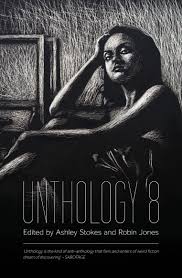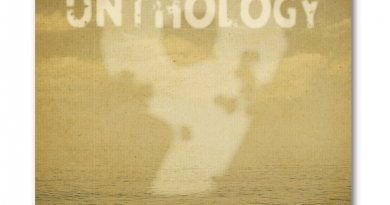Unthology 8 ed. Robin Jones & Ashley Stokes
-Reviewed by Charlotte Barnes–
Unthank Books have carved an important place for themselves in the world of the short story. While many may accuse the form of being limited, and indeed limiting, each Unthology publication to emerge in recent years has made commendable efforts towards disputing that belief, and Unthology 8 continues this admirably. The collection, which is due to be launched in February 2016, is a tremendous whirlwind of emotions encased in neatly composed literary nuggets that, whilst working brilliantly as independent pieces, also band together well to create a memorable and hard-hitting anthology of work.
Ashley Stokes offers a charming Introduction to the publication that sees a quick overview of some Unthology highlights from previous years. He goes on to explain that Unthology, as a series, is primarily concerned with work that breaks out of the boxes that often surround short fiction. The pieces that follow certainly adhere to this.
The collection itself begins with David Frankel’s ‘Beneath The Melting Snow’ which is a strong piece to introduce so early. Frankel’s prose is simply delicious from one-sentence sound-bites to luxurious descriptions of paintings, ultimately delivering a heartfelt snapshot of Edvard Munch in a relatively short stretch of time. As is often the case with Unthology collections, the pace changes rapidly for the story that follows, Rodge Glass’ ‘Bye Bye Ben Ali’, where we are introduced to a wild narrative voice complete with streaks of paranoia that add a truly tense feeling to the text.
Whilst writing review notes for each individual piece, two comments were often repeated: ‘Marvellous title’ or ‘Beautiful opening line’. ‘The Toasted Cheese Sandwich’, by Martin Monahan, certainly warranted the former and, through a sharp but unexpectedly poignant first person narrative, Monahan created one of my favourite submissions to this collection. The bite-size tale introduces the first woman to become a self-made billionaire in Missouri, through a toasted sandwich enterprise no less, and the unexpected passion with which this speaker discusses her professional life is just charming to read.
The likes of Judy Darley’s ‘The Sculptor’ (one of the most poignant and heartfelt submissions in this release; the close third person narrative here is stunning) and Laura Darling’s ‘10,000 Tiny Pieces’ are two examples of marvellous opening lines and the prose that follows certainly lives up to the expectation established in their introductions. The likes of ‘The Sculptor’ and ‘10,000 Tiny Pieces’ navigate their way throughout human relationships and emotions in subtle yet clear prose, something that one or two other entries also succeed in doing. Andre Van Loon’s ‘The Little World’ is a wonderful exploration of a human relationship told through snapshot-style chunks of narrative that allow us to see the central characters of the piece through different lenses, at different points in their romantic struggle. The story that precedes this, ‘The Best Part Of The Day’ by Amanda Mason, is another emotive submission where we observe the protagonist of the piece become entangled in a world outside of her own. Although it’s worth mentioning that Lara Williams’ ‘As Understood By The Women’ does a wonderful job of showing the less poignant moments within romantic relationships, too.
While many of the texts deal with human relationships in one sense or another, many are also well-equipped in making comments on the human condition. Kit Caless’ ‘Not Drowning But Saving’, for example, is one of my favourite plots in this release and the hook of it was entirely unexpected. With an opening line that leads a reader down one very clear path, Caless has turned the prose entirely by the end of the first paragraph and introduces a sordid, but quite delicious, spin on the human desire to perform good deeds. The mischievous ‘Cuts’ by Damon King also has this effect as we observe two men engage in physical violence over having misheard each other, while the narrative voice observes their fight with some glee, raising as many questions about the man behind the narration as it does about the men engaged in the fight.
It is tempting to discuss each story at length from this collection, so rich and fascinating are their prose and plots. However, as a final assessment on the overall release, it seems fair to say that Unthology 8 is an outstanding illustration of what authors are capable of doing inside the confines of the short story genre. As always, the Unthology series has provided ample evidence for precisely why this genre is still so popular amongst readers, particularly with fiction that covers everything from romantic corruption (Armel Dagorn’s ‘Nora and Anthony’ is another fine example of this) to family disputes (the brilliantly titled ‘How To Get Your Guts Back’ by Clare Fisher is a beautiful, albeit understated, view of family life and its fallout).
This collection is yet another tick in the column in favour of the short story genre and, given the strength of Unthology 8, I would say there are definitely more of these ticks to come from Unthank Books in the future.



